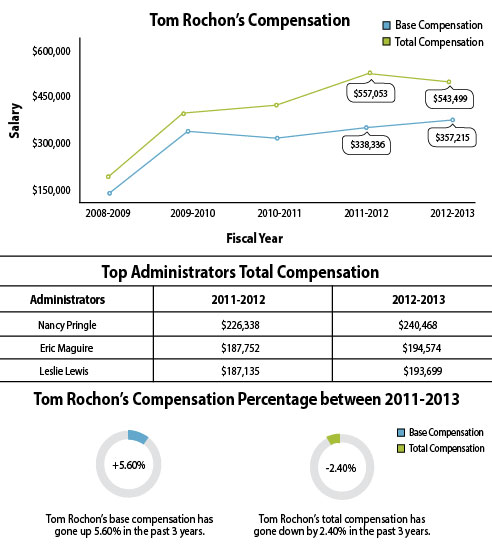The recent release of the IRS Form 990 for Ithaca College indicates increases in base compensation values for the college’s key administrators, including President Tom Rochon, for the fiscal year ending in May 2013.
Rochon’s base compensation was $357,215 for the 2012–13 fiscal year, — a 5.58 percent increase from the $338,336 he earned in 2011–12, according to the Form 990 provided by the college’s Office of Business and Finance.
Faculty and staff received a 2.5 percent general merit increase in 2013–14, as they did in the fiscal year 2012–13.
Rochon’s total compensation for 2012–13, which includes the base, retirement and deferred compensation, and nontaxable benefits, was $543,499, a 2.43 percent decrease from his $557,053 total salary for 2011–12, according to the Form 990.
Rochon was not available for comment. Gerald Hector, vice president of finance and administration, declined to comment.
In terms of base compensation, Nancy Pringle, vice president and general counsel of legal affairs, earned $176,741 in 2012–13 compared to $171,173 in 2011–12; Eric Maguire, vice president of enrollment and communication, earned $168,288 in base compensation compared to $161,887 three years ago; and Leslie Lewis, dean of the School of Humanities and Sciences, increased from $164,838 to $171,150, according to the Form 990.
In total compensation, Pringle’s earnings increased from $226,338 to $240,468, Maguire’s increased from $187,752 to $194,574, and Lewis’ total compensation increased from $187,135 to $193,699, according to the Form 990.
Administrative salaries are determined through the college’s compensation plan, which includes a salary increment and salary increment pool, Hector said. The salary increment pool is how raises are distributed to the administration.
“The pool is something that we build into when we’re building the budget, and everyone that worked at the institution and performed at a certain level participated in that pool,” Hector said. “There is a formal process to human resources that everyone has to go through, and everyone has to fill out an annual evaluation and they have to have discussions.”
He said there is no set salary adjustment for each administrator.
“It’s merit-based, so your performance counts for how your increments will be,” Hector said. “But the increment is at a certain cap for the institution across the board, so that’s how everybody else is adjusted.”
Pringle said the compensation plan also includes benefits for the college’s staff.
She said the college makes sure to provide universal benefits, such as health care and dental, to everyone at the institution.
“On the 990, there’s a column called ‘deferred compensation,’” she said. “It’s not guaranteed, but … often times, deferred compensation is in lieu of putting money into salary.”
Overall, Hector said, the college has seen a 2.99 percent comprehensive increase in its tuition and fees since the last fiscal year.
He said the college operates on a discount rate system, where the college looks at the increase in tuition and fees, which does not include the price of room and board, in terms of the kinds of institutional aids that will make college affordable for students.
“As you might very well know, although the sticker price is $53,807, students are not paying $53,807,” Hector said. “They are paying much less than that, depending on a number of variables that goes into financial aid awarding and packaging.”
Pringle said because the college is a tuition-driven institution, the college’s annual tuition rate depends on the college’s overall budget. She said Rochon plans to keep rates as low as possible while contributing to the salaries of the administration.
“The president has committed to keeping the tuition increases as low as we possibly can while at the same time making sure we compensate those employees who are here,” she said.








